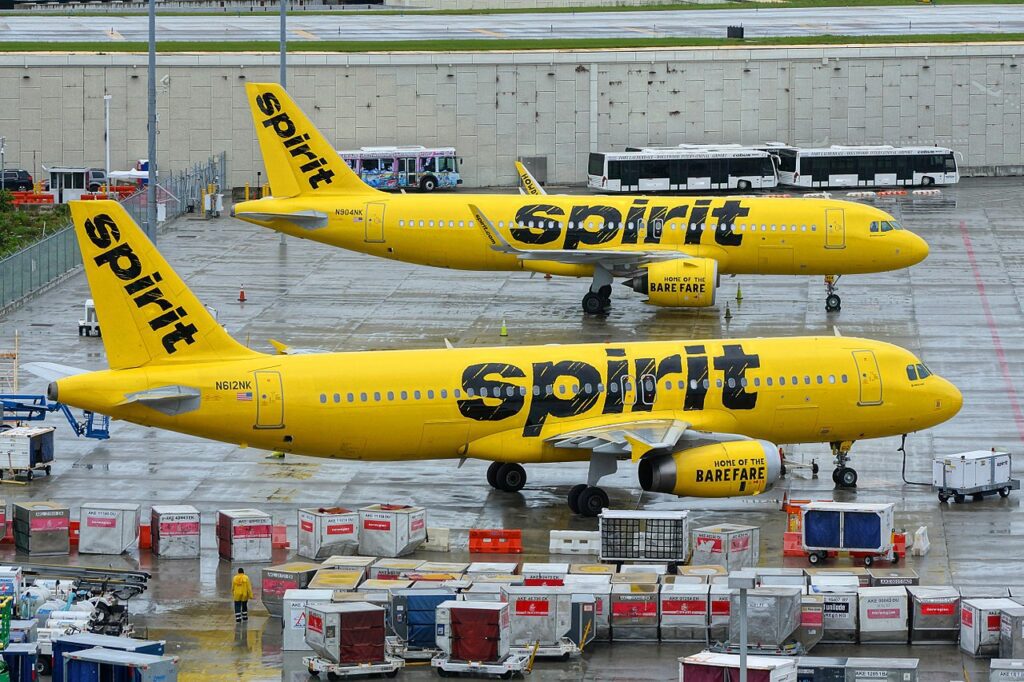
Skift Take
The head of an industry trade group sounded the alarm for ultra-low-cost carriers as airlines like Spirit and Frontier face declining profits. However, other carriers in the industry have seen some success despite industry headwinds.
Spirit Airlines and Frontier Airlines haven’t been profitable in recent years. And now they’re making moves you wouldn’t expect from ultra-low-cost carriers — they’re bundling fares and offering a premium product.
But will it work?
“This is a perilous time for [ultra-low-cost]. We have a difficult environment right now,” said George Novak, the head of the National Air Carrier Association, a trade group that oversees smaller and ultra-low-cost airlines, at an industry event in Washington, D.C. on Tuesday.
Just hours earlier at the same event, United Airlines CEO Scott Kirby said ultra-low-cost carriers’ “fatal flaw” was that they’ve focused too much on costs instead of profitability. “Horrible product for customers, they didn’t invest anything in the product or customer and crammed as many seats as possible,” Kirby said.
Novak acknowledged some of Kirby’s points, but added that he believed legacy carriers don’t want budget airlines in the market.
“As far as his comments are concerned, it’s wishes for fishes,” Novak said. “You know, the majors do not want the ULCC. They do not want low cost to enter, because in turn, you have to lower your cost. So if you have competition, your fares have to remain low.”
Spirit Is in the Hot Seat
The debate on the viability of the ultra-low-cost model comes as Spirit faces a crucial deadline extension to complete renegotiations for around $1.1 billion in debt. The carrier said in regulatory filing on Tuesday that it entered an agreement to extend the deadline to October 21 from September 20.
Some Wall Street analysts have speculated that the negotiations could potentially heighten the risk for a bankruptcy or that a better outcome for the beleaguered airline could be a merger with Frontier. So far, Frontier and Spirit haven’t expressed any interest in a merger.
“We believe the risk of a pre-packaged filing, and deteriorating fundamentals make the stock a ‘stay away,’” TD Cowen analyst Thomas Fitzgerald wrote in a note to investors July 16.
However, things have been looking up for other ultra-low-cost carriers. Frontier, for example, said in a regulatory filing Wednesday that it expects its adjusted pre-tax margin to decline less than it previously thought. It said its guidance was boosted by lower fuel prices and better-than-expected revenues.
Other ULCCs See Some Returns
Other carriers like Sun Country and Allegiant have also been relatively profitable in recent years. While the carriers run an ultra-low-cost business model, both focus on more niche routes, which has helped their bottom lines.
Sun Country is mostly based out of Minneapolis, and Allegiant doesn’t compete with other airlines on many of its routes.
New Allegiant CEO Greg Anderson said at the industry event that he was focused on strengthening the carrier’s profitability after it reported a major dip in profits for the second-quarter.
Anderson said Allegiant hopes to introduce its first Boeing 737 Max 8-200 as soon as November. The carrier took its first delivery of the aircraft September 9 and is currently conducting “ditching exercises” with the Federal Aviation Administration at its base at Phoenix-Mesa Gateway Airport.
Allegiant, whose fleet has been mostly Airbus A320s, hopes that the 737 Max will play a major role in its growth.
However, Anderson said he believed Allegiant was significantly different from the likes of Spirit and Frontier.
“In most of the markets they serve, they’re competing with the Deltas and Uniteds,” Anderson said.
Airlines Sector Stock Index Performance Year-to-Date
What am I looking at? The performance of airline sector stocks within the ST200. The index includes companies publicly traded across global markets including network carriers, low-cost carriers, and other related companies.
The Skift Travel 200 (ST200) combines the financial performance of nearly 200 travel companies worth more than a trillion dollars into a single number. See more airlines sector financial performance.
